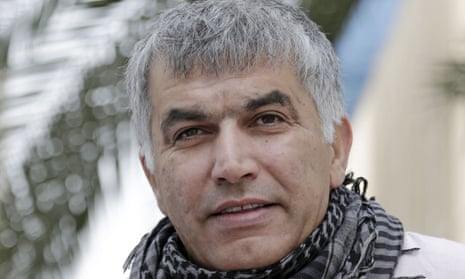The Bahrain government, under renewed international criticism for arresting human rights activists and closing down an opposition party this week, is paying the bulk of the costs of the construction of a new Royal Navy base in its country, a freedom of information request has revealed.
The precise value of the Bahrain contribution is being kept secret under UK government disclosure rules, but the UK is to pay only £9m over three years towards the construction of the new naval base central to the UK government’s new “East of Suez” strategy. The contract for the Mina Salman support facility was signed in 2014. It is currently under construction and is designed to service all Royal Navy ships in the region.
Britain pulled back from the Gulf in the early 1970s, but with the US focusing more of its attention on the Asia-Pacific region, the UK envisages an enhanced role east of Suez in the Gulf, the Near East and north Africa, and the new base is part of that strategy.
In a major new report reviewing the Foreign Office relations with Bahrain, which is a former UK protectorate, the UK-based Bahrain Institute for Rights and Democracy (Bird) claims the UK has become “an unconditional ally” of the Sunni-led kingdom.
Bird claims that the UK government’s interest in Bahrain’s human rights and promoting political dialogue has “declined precipitously” since the 2014 agreement to construct the port, with the number of meetings between the Foreign Office and Bahrain advocacy groups falling sharply.
It also claims UK government funds to improve Bahrain human rights institutions since the repression that followed the Arab spring has largely been spent on well-intentioned bodies that have proved not to be truly independent of government.
The criticisms, in a 75-page report assessing the Foreign Office approach to Bahraini politics, comes after a Bahraini court suspended the activities of the country’s main Shia opposition group on charges of terrorism, extremism and violence. The court declared the Al-Wefaq society suspended pending a decision on its total dissolution.
The decision to suspend Al-Wefaq came the day after the family of leading human rights activist Nabeel Rajab said he had been detained by police. Another prominent activist, Zainab al-Khawaja, fled to Denmark last week after reportedly being threatened with prison.

Rajab was charged with publishing and broadcasting false news that undermined the prestige of the state. He was detained for seven days. His arrest came as Bahraini human rights activists travelled to Geneva for the opening day of a session of the UN’s human rights council. His arrest has been condemned by the UN and the US State Department.
Since the Bahraini uprising in 2011, Rajab has spent two years in jail between 2012 and 2014. The government says the resistance movement is funded and supported by Iran.
The latest crackdown – five years after the uprising – is a setback for the UK government, which has invested considerable effort and £3.4m in providing technical assistance on human rights to the UK’s closest ally in the Gulf.
Bird claims this assistance “has become a facade to hide the lack of political will in the kingdom to implement reforms”.
The Foreign Office funding helps with a new ombudsman for the Ministry of Interior, the National Institute for Human Rights, the Prisoners’ and Detainees’ Rights Commission, as well as to train the police and judiciary.
Allegations of arbitrary arrest and torture are frequently made against the authorities.
Bird claims the ombudsman is appointed by the minister and partly funded by the interior department. Any complaints of torture or mistreatment have to be sent to the special investigations unit in the public prosecutor’s office, and there is no guarantee that complaints to the ombudsman are kept confidential from other government departments, with the result that witnesses are intimidated.
Similarly, Bird questions the independence and quality of the prisoners’ rights and human rights committee, since many of its key figures are members of the Bahraini parliament, which denies that torture takes place in the country.
The UN special rapporteur on torture has been repeatedly denied entry to Bahrain.

Bird claims: “The laws governing these bodies, and actions by individuals within them, undermine the mandates of all these institutions. The net effect is to give the appearance of substantial reform: however, they continue to fail to hold human rights violators to account. No high-level official has been held to account for any human rights abuses occurring between 2011 and the present, and no such official looks set be held accountable.”
The Foreign Office points out it has classified Bahrain as a country of human rights concern, and the decline in contact appears to stem from the UK government’s regret that the main opposition party, Al-Wefaq, decided to boycott the 2014 Bahrain elections.
But Bird claims: “The UK government has avoided overtly criticising the government of Bahrain for the prosecution of political leaders, human rights activists, trade unionists and street protesters alike. Rather than sending a clear message rejecting the abuse of human rights and condemning the arbitrary arrest of human rights defenders and opposition leaders, the FCO instead calls for due process to be followed.”
They said foreign secretary Philip Hammond’s last visit to Bahrain on 30 May, when he welcomed “Bahrain’s commitment to continuing reforms”, came on the same day an appeals court increased Al-Wefaq leader Sheikh Ali Salman’s prison sentence from four years to nine.









